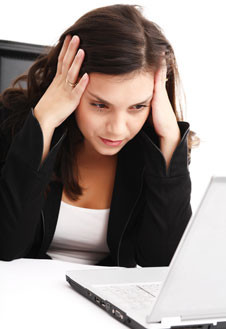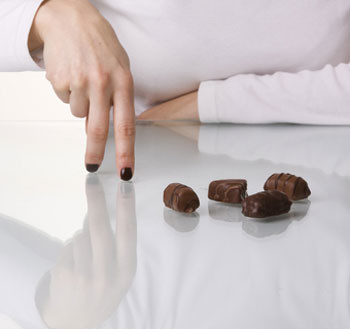Trying to achieve perfection sometimes leads tostress. Diets also cause stress. Illnesses of loved ones - How do we react? We start looking for a "cure" for mental pain, fatigue or melancholy. Alcohol? Drugs? For many women, such a cure is food. Excess food, naturally, leads to weight gain, which, as you might guess, only increases the same stress. How to get rid of stress
How to get rid of stress
 Mini-test. If you answered "yes" to at least three questions, most likely, use food as a means to relieve stress
Mini-test. If you answered "yes" to at least three questions, most likely, use food as a means to relieve stress
Why does stress increase appetite?The stress hormones cortisol and the anxiety hormone (its scientific name is corticotropin-releasing hormone) peak in the early morning, between 6 and 8 a.m. This is when you feel energetic and find it easy to focus and concentrate. By lunchtime, the stress hormone levels gradually decrease, and in the afternoon you feel a lack of energy and find it difficult to concentrate. This usually happens between 3 and 4 p.m. Biologically, your body begins to prepare for rest and then sleep after a long, stressful day. Finally, the hormone levels reach a minimum during sleep so that you can fully rest. By 2 a.m., they begin to rise again, preparing you for the morning awakening. Following the natural biorhythm of stress hormones, we would have dinner early and go to bed at 8-9 p.m. Overeating in the afternoon is the main reason for stress-induced excess weight in women. The time between 3 p.m. and midnight can be called the CortiZone: the level of the stress hormone cortisol drops. Today, we no longer live in accordance with the natural cycle of stress hormones. When it is time to rest, we still have many urgent matters to attend to, crowded transport, business dinners and countless household chores. Tired and anxious, we seek in food a source of energy and a cure for the negative emotions caused by the need to cope with the stress of the afternoon. It is not surprising that by dinner a person wants to "reward" himself for having managed to survive another day. Women who feel especially tired and overloaded often enjoy snacking after dinner, late at night. They are looking for a quick, immediate satisfaction on their plate.
 Golden rules of nutrition for every dayNeedLearn to safely overcome CortiZone and finally break the vicious circle of overeating. During main meals, 55-60% of calories should come from carbohydrates, with preference given to complex carbohydrates (unrefined cereals, vegetables and fruits); 15-20% - from proteins and 25% - from fats. If you have breakfast before 7 am, have a snack after 3 hours. Be sure to eat something protein (for example, yogurt) and fruit, and lunch should be between 12.00 and 13.00. If you have breakfast after 8 am, ideally between breakfast and lunch you should snack only on fruit. An afternoon snack should be 3 hours after lunch. It should include proteins, carbohydrates and little fat. For example, soup with crackers, low-fat cottage cheese with fruit, low-fat yogurt or kefir. Try to ensure that the "lion's share" of what you eat during the day does not fall during the CortiZone period. Consume most of your calories (about 65%) before 5 p.m. Watch the time! If you eat too much after 8 p.m., you will gain weight. How to tame the "overeating hormones"? People who overeat under the influence of stress "program" their "CortiZone" problems from the very morning, during breakfast. In the morning, they either eat too many carbohydrates and too little protein, or skip breakfast altogether. They also skip lunch or eat very symbolically: yogurt, a little cottage cheese, a couple of sandwiches or a bowl of soup. It's no wonder that by the time X hour arrives, they're feeling very hungry. If stress is stimulating your appetite, your job is to develop resistance to it. To do this, you need a meal plan for the "dangerous" time of day - CortiZone. You also need to change your daily habits to keep your stress hormone levels as close to normal as possible and avoid mindless munching (and the inevitable extra weight that comes with it).
Golden rules of nutrition for every dayNeedLearn to safely overcome CortiZone and finally break the vicious circle of overeating. During main meals, 55-60% of calories should come from carbohydrates, with preference given to complex carbohydrates (unrefined cereals, vegetables and fruits); 15-20% - from proteins and 25% - from fats. If you have breakfast before 7 am, have a snack after 3 hours. Be sure to eat something protein (for example, yogurt) and fruit, and lunch should be between 12.00 and 13.00. If you have breakfast after 8 am, ideally between breakfast and lunch you should snack only on fruit. An afternoon snack should be 3 hours after lunch. It should include proteins, carbohydrates and little fat. For example, soup with crackers, low-fat cottage cheese with fruit, low-fat yogurt or kefir. Try to ensure that the "lion's share" of what you eat during the day does not fall during the CortiZone period. Consume most of your calories (about 65%) before 5 p.m. Watch the time! If you eat too much after 8 p.m., you will gain weight. How to tame the "overeating hormones"? People who overeat under the influence of stress "program" their "CortiZone" problems from the very morning, during breakfast. In the morning, they either eat too many carbohydrates and too little protein, or skip breakfast altogether. They also skip lunch or eat very symbolically: yogurt, a little cottage cheese, a couple of sandwiches or a bowl of soup. It's no wonder that by the time X hour arrives, they're feeling very hungry. If stress is stimulating your appetite, your job is to develop resistance to it. To do this, you need a meal plan for the "dangerous" time of day - CortiZone. You also need to change your daily habits to keep your stress hormone levels as close to normal as possible and avoid mindless munching (and the inevitable extra weight that comes with it).
 5 ways how this can be done1.You need to psychologically come to terms with the fact that for objective reasons you feel physically and mentally tired after 3 p.m., and not worry that "there is still a lot of work ahead, and your strength is already running out." Try to plan your day so that after three o'clock in the afternoon you have less intense and difficult work planned. If you have no choice, during CortiZone you are forced to work like a bee, break each task into small stages-tasks that will be easier to cope with. 2. Be careful with the products from which you are used to drawing strength and calm. These "benefits" come at a high price. Caffeine, nicotine, drugs (for example, for weight loss), alcohol, refined sugars and fats give rise to new problems. 3. Physical activity at any time of the day helps you feel more energetic during CortiZone. Both regular and emergency workouts are the easiest way to calm down and invigorate yourself at the same time. In a stressful situation, it is ideal, for example, to walk at a fast pace for 30-45 minutes. But even if you walk for a couple of minutes, the stress noticeably recedes. Exercise regulates the level of stress hormones: the body produces beta-endorphins, which act as a natural stimulant. Endorphins block stress reactions in the body. 4. Learn to mobilize your strength in the face of stress. Deep breathing techniques, meditation, and the ability to switch attention from negative thoughts to neutral or positive ones will come in handy. 5. Arm yourself with a meal plan for the day (see above, "Golden rules of nutrition for every day"). Plan in advance what you will eat for an afternoon snack and dinner.
5 ways how this can be done1.You need to psychologically come to terms with the fact that for objective reasons you feel physically and mentally tired after 3 p.m., and not worry that "there is still a lot of work ahead, and your strength is already running out." Try to plan your day so that after three o'clock in the afternoon you have less intense and difficult work planned. If you have no choice, during CortiZone you are forced to work like a bee, break each task into small stages-tasks that will be easier to cope with. 2. Be careful with the products from which you are used to drawing strength and calm. These "benefits" come at a high price. Caffeine, nicotine, drugs (for example, for weight loss), alcohol, refined sugars and fats give rise to new problems. 3. Physical activity at any time of the day helps you feel more energetic during CortiZone. Both regular and emergency workouts are the easiest way to calm down and invigorate yourself at the same time. In a stressful situation, it is ideal, for example, to walk at a fast pace for 30-45 minutes. But even if you walk for a couple of minutes, the stress noticeably recedes. Exercise regulates the level of stress hormones: the body produces beta-endorphins, which act as a natural stimulant. Endorphins block stress reactions in the body. 4. Learn to mobilize your strength in the face of stress. Deep breathing techniques, meditation, and the ability to switch attention from negative thoughts to neutral or positive ones will come in handy. 5. Arm yourself with a meal plan for the day (see above, "Golden rules of nutrition for every day"). Plan in advance what you will eat for an afternoon snack and dinner.









